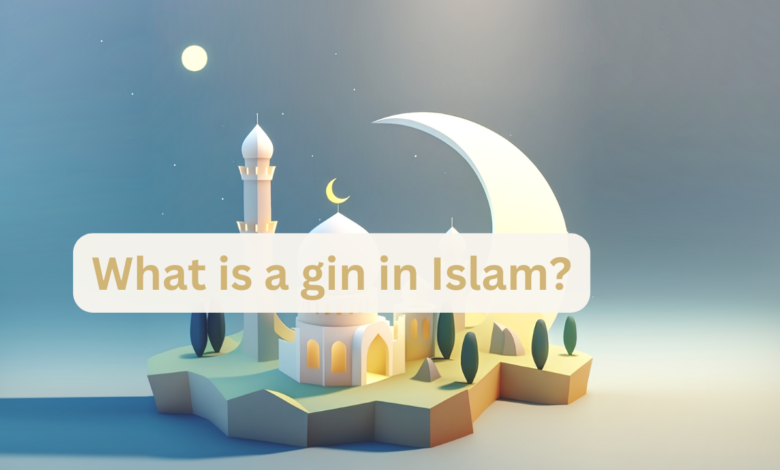What is a gin in Islam?
Unveiling the Enigma: Jinn in Islam and Their Mystical Realm

What is a gin in Islam?
Jinn are supernatural beings in Islamic belief, created by Allah from smokeless fire. They possess free will and inhabit a hidden realm beyond human perception.

Introduction
Islam is a religion with a rich tapestry of beliefs, practices, and supernatural beings. Among these beings, the jinn, often pronounced as “gin,” hold a unique and mysterious place. These supernatural entities have been mentioned in Islamic texts and folklore for centuries, and their existence and nature are subjects of intrigue and curiosity. In this article, we will delve into what a jinn is in Islam, exploring their origin, characteristics, and significance in Islamic theology and culture.
The Origins of Jinn
The concept of jinn in Islam can be traced back to the Quran, the holy book of Islam. In Arabic, the term “jinn” is derived from the root word “janna,” which means to hide or conceal. This root word aptly describes the nature of jinn, as they are hidden from human sight and exist in a realm beyond the ordinary.
According to Islamic tradition, Allah created the jinn from a smokeless and scorching fire, while humans were created from clay or dust. This distinction in their origins is significant, as it highlights the inherent differences between the two creations.
Also check.
- What is Shirk in Islam
- Who are Kiraman Katibin in Islam?
- When was the Prophet Muhammad born?
- What is difference between Sunni and Shia?
- What are the most important things in Islam?
Characteristics of Jinn
- Invisible Beings: One of the defining characteristics of jinn is their invisibility to humans. They exist in a parallel world, often referred to as the “unseen” or “hidden” realm. This invisibility allows them to move among humans without being detected.
- Free Will: Like humans, jinn possess free will. They can choose to do good or evil, obey Allah’s commands, or engage in disobedience. This free will makes them accountable for their actions on the Day of Judgment, similar to humans.
- Diverse Abilities: Jinn are not limited by the physical laws that govern the human world. They have a range of abilities, including shape-shifting, teleportation, and influencing human thoughts and actions. However, these abilities are subject to Allah’s will and are not unlimited.
- Varied Characteristics: Just as humans have diverse personalities and characteristics, so do jinn. Some are believed to be mischievous or malevolent, while others may be benevolent or neutral.
Significance of Jinn in Islam
The jinn play a significant role in Islamic theology and culture:
- Spiritual Tests: Jinn are part of the spiritual tests and trials faced by humans. They can whisper temptations and doubts to individuals, testing their faith and moral resolve. Muslims are encouraged to seek protection from such negative influences through prayers and supplications.
- Prophetic Narratives: Islamic tradition contains numerous stories and accounts involving interactions between prophets and jinn. These narratives highlight the spiritual dimensions of jinn and their role in conveying Allah’s messages.
- Exorcism and Ruqyah: In cases of possession or spiritual affliction, Islamic tradition advises seeking protection and healing through recitations of specific verses from the Quran and supplications known as “ruqyah.” These practices are believed to help expel malevolent jinn.
- Folklore and Culture: Jinn are a common theme in Islamic folklore and culture. Tales of encounters with jinn, both benevolent and malevolent, have been passed down through generations, shaping cultural practices and beliefs.
Conclusion
In Islam, a gin is not a beverage but rather a reference to jinn, supernatural beings created by Allah from smokeless fire. Their existence and characteristics are outlined in Islamic texts and traditions, and they play a significant role in the spiritual and cultural aspects of Islam. While jinn are invisible to humans, their presence is acknowledged, and believers are encouraged to seek protection from negative influences and maintain a strong faith in Allah. Understanding the concept of jinn provides insight into the multifaceted nature of Islamic belief and practice, enriching our appreciation of this diverse and spiritually rich religion.
FAQs
What are jinn in Islam?
Jinn are supernatural beings in Islamic belief, created by Allah from smokeless fire. They possess free will and inhabit a hidden realm beyond human perception.
How are jinn different from humans?
Humans were created from clay or dust, while jinn were created from fire. Jinn are invisible to humans and have unique abilities not bound by physical laws.
Do jinn have free will?
Yes, jinn have free will, just like humans. They can choose to do good or evil, and they are accountable for their actions on the Day of Judgment.
What is the significance of jinn in Islam?
Jinn play a role in spiritual tests and trials, often whispering temptations and doubts to humans. They also appear in prophetic narratives and cultural folklore, shaping Islamic beliefs and practices.
How can one protect themselves from negative influences of jinn?
Muslims seek protection from negative jinn influences through prayers, supplications, and recitations of specific Quranic verses known as “ruqyah.” Maintaining a strong faith in Allah is also believed to provide protection.
Are all jinn malevolent?
No, jinn vary in nature. Some are believed to be malevolent or mischievous, while others may be benevolent or neutral. Their actions depend on their individual choices.
Can jinn possess humans?
Islamic tradition acknowledges the possibility of jinn possession in rare cases. In such situations, seeking spiritual healing through ruqyah and prayers is recommended.
Are there specific Quranic references to jinn?
Yes, the Quran mentions jinn in several verses, such as Surah Al-Jinn (Chapter 72), which provides insights into their existence and interactions with humans.
Do jinn have a role in Islamic culture and folklore?
Yes, jinn are a common theme in Islamic folklore and culture. Stories of encounters with jinn, both positive and negative, have been passed down through generations, influencing cultural practices and beliefs.
Can jinn be seen by humans?
Generally, jinn are invisible to humans. However, there are rare instances where they may choose to reveal themselves to individuals, often for specific purposes or in unique circumstances.




